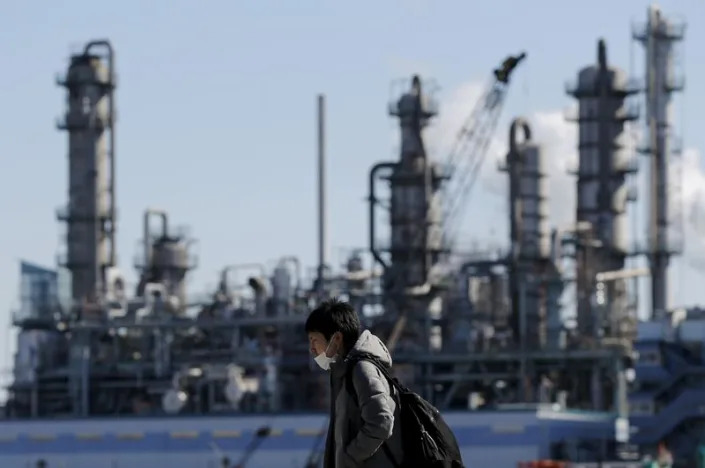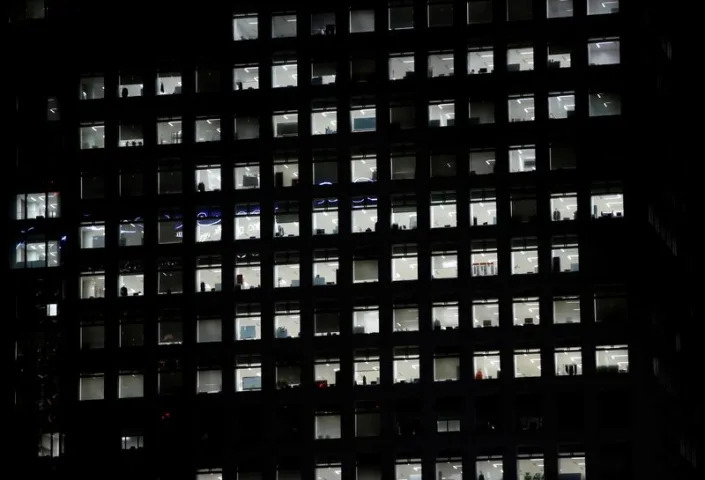

Tue, March 7, 2023
By Tetsushi Kajimoto and Leika Kihara
TOKYO (Reuters) - Every March, management of major Japanese firms meet with unions for wage talks across industries that set the tone for employees' pay in the new fiscal year.
The precedent set at the "shunto" spring wage talks also influences wages at smaller firms that employ seven out of 10 Japanese workers and supply big manufacturers.
The outcome will have a huge influence on how soon the Bank of Japan (BOJ) could end ultra-low interest rates, as steady wage hikes are crucial to kick-starting domestic demand and keeping inflation sustainably around its 2% target.
Here is an overview of the wage negotiations: and why they are important.
HOW IS PAY DECIDED IN JAPAN?
In around March of each year, companies and union negotiate pay for the fiscal year beginning in April of that year.
The practice, known as "shunto," began in 1956 when Japan's postwar economy was booming. Unions demanded improvement in wages and job conditions by resorting to strikes in big cities.
The talks peaked in 1974 with a record 33% rise in pay. The increases fell below 3% after Japan slipped into deflation and prolonged economic stagnation in the 1990s.
Unionists have long since turned cooperative, rather than combative, working with management on the shared objective of job security rather than higher pay.
The focus on job security, rather than higher pay, is blamed for keeping Japan's wage growth stagnant.
WHY ARE COMPANIES UNDER PRESSURE?
Former Prime Minister Shinzo Abe's "Abenomics" stimulus policies helped boost corporate profits, but failed to prod firms to trickle down the benefits to households via wage hikes.
Incumbent premier Fumio Kishida wants to change this under his flagship "new capitalism" policies that seek to distribute wealth more broadly among the population through higher pay.
He has called on companies to achieve wage hikes that exceed the pace of inflation to help households weather rising living costs brought by a spike in fuel and raw material prices.
Aside from such political pressure, companies also need to offer higher pay to retain talent and hire young workers as Japan's rapidly aging population intensifies a labour crunch.
WHAT WILL BE THE OUTCOME OF THE WAGE TALKS?
Some of Japan's biggest firms have already promised large pay hikes including auto giant Toyota and fashion brand Uniqlo parent Fast Retailing.
Analysts expect big firms to offer wage hikes of around 3% in wage talks, which would be the fastest pace of increase since 1997 when Japan was on the cusp of deflation. That would follow a 2.2% increase in 2022, which was the first hike in four years.
Such hikes would meet Kishida's calls for companies to offer annual wage hikes of 3% but miss an ambitious goal of a 5% pay increase demanded by Japan's labour umbrella Rengo.
WILL WAGES KEEP RISING?
The key for the economy will be how much companies will raise base pay, which are across-the-board and permanent payments that provide the basis of future allowances like retirement and pensions.
Wary of increasing fixed costs, many Japanese firms long compensated employees with one-off bonus payments in good times rather than raising base pay.
As Japan slid into deflation in the late 1990s, management and unionists agreed to no base-pay hikes for more than a decade through 2013.
Kishida has approached Japan's union umbrella Rengo in prodding firms to hike base pay. Rengo is demanding a 5% pay hike that includes a base pay rise of 3%, which many analysts see as too ambitious for many firms to swallow.
Of the 2.85% wage hike projected by economists in a January poll, 1.08% is comprised by base pay hikes and another 1.78% increase in additional salary based on seniority.
(Reporting by Tetsushi Kajimoto and Leika Kihara; Editing by Sam Holmes)
Japan's workers eye bumper pay hike in closely watched union talks
Tetsushi Kajimoto and Leika Kihara
Tue, March 7, 2023 at 11:22 PM MST·4 min read
*
Major wage talk outcomes due on March 15
*
Big firms to offer average pay rise of 2.85% - poll
*
Meagre rise in base pay casts doubt on outlook for future gains
*
Uncertainty on wage outlook may keep BOJ from early exit
(Adds govt plan for talks with firms, unions in 5th paragraph)
By Tetsushi Kajimoto and Leika Kihara
TOKYO, March 8 (Reuters) - Japan's big companies are expected to deliver the largest pay rise in 26 years in next week's "shunto" wage negotiations, offering policymakers hope the country might finally emerge from its deflationary doldrums.
But the expected average salary hike of around 3% will likely include just a 1% increase in base pay, casting doubt on whether Japan can achieve the kind of sustained wage gains the central bank sees as key to stably hitting its 2% inflation target.
The outcome of "shunto" wage talks with unions, many of which conclude on March 15, will be crucial to how soon the Bank of Japan (BOJ) could end its bond yield control policy under incoming governor Kazuo Ueda.
It will also test Prime Minister Fumio Kishida's flagship "new capitalism" policy that aims to more widely distribute wealth among households by prodding firms to hike pay.
The government is preparing to hold a meeting with business and union executives on March 15, the first to be held in about eight years, its top spokesperson said on Wednesday in a sign of the focus Kishida is putting on achieving wage hikes.
Hopes are running high that Japan, which has seen wages stagnate for nearly three decades, will finally see change as companies face pressure to beat a labour crunch and compensate employees for inflation running well above the BOJ's target.
World's largest car maker Toyota accepted a union demand for the biggest base salary growth in 20 years, while gaming giant Nintendo plans to lift base pay by 10%.
Big firms will offer on average pay rises of 2.85% for the financial year beginning in April, which would be the fastest pace of increase since 1997, a survey by the Japan Economic Research Center (JERC) showed in January.
The gain will comprise a 1.08% rise in base pay and a 1.78% increase in additional salary based on seniority, it said.
Such hikes would meet Kishida's calls for companies to offer annual wage hikes of 3%, but miss an ambitious goal of a 5% pay increase demanded by Japan's labour umbrella Rengo.
Some analysts doubt whether smaller firms can follow suit, as stubbornly high raw material costs erode their margin.
More than 70% of small firms have no plan to raise wages, according to a January poll by the Jonan Shinkin Bank and the Tokyo Shimbun newspaper.
There is also uncertainty on whether companies will keep hiking wages as much next year and beyond.
After hitting a nearly 42-year high of 4.3% in January, core consumer inflation in Japan's capital Tokyo - a leading indicator of nationwide trends - slowed to 3.3% in February.
The BOJ expects core consumer inflation to slow back below its 2% target towards the year-end, which will take some pressure off firms to keep hiking pay next year.
"Certainly, wages are expected to swing upward considerably in this year's spring wage talks, but this will be very transitory," said former BOJ board member Takahide Kiuchi, who is now executive economist at Nomura Research Institute.
"A virtuous cycle between wages and prices is unlikely," he said of the chance Japan can achieve a combination of rising prices and higher wages - a condition the BOJ sees crucial in heading for an exit from its ultra-loose policy.
Markets are rife with speculation the BOJ will end its unpopular bond yield control policy soon after Ueda - chosen by Kishida to become next BOJ chief - takes the helm in April.
Uncertainty over the sustainability of wage hikes could prod the BOJ to go slow in dialing back stimulus, some analysts say.
Speaking in parliament, Ueda said he was mindful of the demerits of prolonged easing. But he added the recent cost-push inflation must shift to one backed by solid wage growth for the central bank to end ultra-low interest rates.
"The average pace of wage gains consistent with 2% inflation would be around 3%. If wage gains stably exceed 3%, the BOJ may need to overhaul its monetary framework," said Hisashi Yamada, senior economist at Japan Research Institute.
"But there's a chance this year's wage hike could prove temporary. The BOJ will probably wait until next year in doing anything radical, such as ending its bond yield control policy." (Reporting by Tetsushi Kajimoto and Leika Kihara; Editing by Sam Holmes)
No comments:
Post a Comment